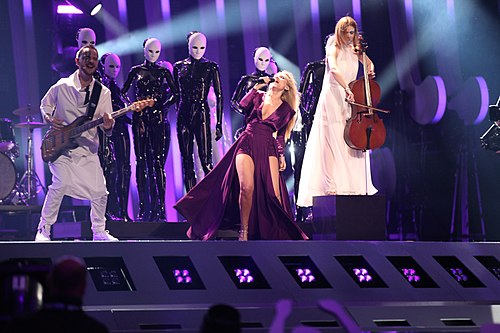User:Ktkvtsh/Portal draft
Portal maintenance status: (August 2023)
|
The Eurovision Song Contest Portal
Selected Entrant of the Day
In 2014, RiskyKidd and Freaky Fortune were chosen to represent Greece in that year's Eurovision Song Contest with the song "Rise Up".They finished in 20th place with 35 points.
He currently releases his music independently through Melody Gang, a joint venture with Gio Melody. His upcoming album is titled I Am Risky II. (Full article...)
Entries here consist of Featured and Good articles, which meet a core set of high editorial standards.
"Feel the Passion" is a song by Albanian singer Aurela Gaçe. It was issued as a CD single on 15 April 2011 by EMI. The English-language pop and rock song was composed by Shpëtim Saraçi and written by Sokol Marsi. An accompanying music video premiered on the official YouTube channel of the Eurovision Song Contest on 16 March 2011. The song represented Albania in the Eurovision Song Contest 2011 in Düsseldorf, Germany, after Gaçe won the pre-selection competition Festivali i Këngës with the Albanian-language version "Kënga ime". It failed to qualify for the grand final in fourteenth place marking the country's third non-qualification in the contest. During her show, Gaçe was accompanied by three backing vocalists and two instrumentalists, while the Albanian theme was visually amplified by the wings of a white and red coloured eagle on the LED screens. (Full article...)Entries here consist of Featured and Good articles, which meet a core set of high editorial standards.
The Eurovision Song Contest 1995 was the 40th edition of the Eurovision Song Contest, held on 13 May 1995 at the Point Theatre in Dublin, Ireland. Organised by the European Broadcasting Union (EBU) and host broadcaster Radio Telefís Éireann (RTÉ), and presented by Mary Kennedy, the contest was held in Ireland following the country's victory at the 1994 contest with the song "Rock 'n' Roll Kids" by Paul Harrington and Charlie McGettigan. It was the third consecutive contest to be held in Ireland – the first and only time in the history of the event that a country has hosted three editions in a row – and the second consecutive edition to be held in the Point Theatre in Dublin. (Full article...)Did you know (auto-generated)

- ... that in Eurovision Song Contest history, over 1,500 songs, representing 52 countries, have been performed?
Selected Picture of the Day

The Humans representing Romania with the song "Goodbye" during a rehearsal before the second semi final of the Eurovision Song Contest 2018 in Lisbon.
Credit: Roger Dewayne Barkley, EuroVisionaryCristina Caramarcu sings as Corina Matei plays the cello and Alexandru Cismaru plays guitar. Manequins are positioned behind them, dressed in black leather suits and white masks representing the depersonalization and the loss of identity in modern society.
Major topics
Associated Wikimedia
The following Wikimedia Foundation sister projects provide more on this subject:
-
Commons
Free media repository -
Wikibooks
Free textbooks and manuals -
Wikidata
Free knowledge base -
Wikinews
Free-content news -
Wikiquote
Collection of quotations -
Wikisource
Free-content library -
Wikiversity
Free learning tools -
Wiktionary
Dictionary and thesaurus










